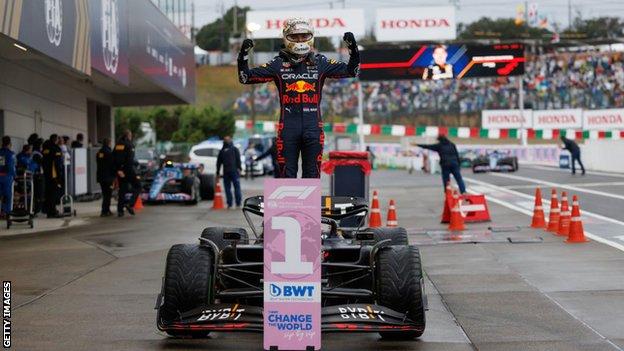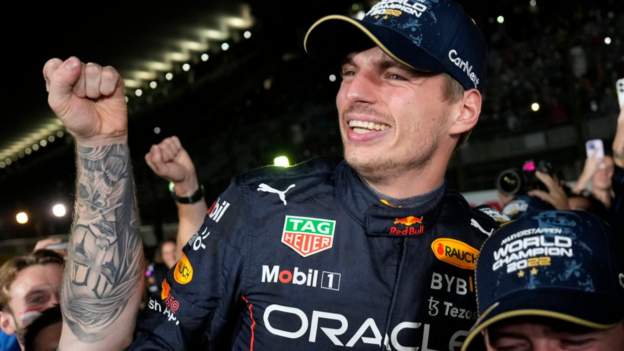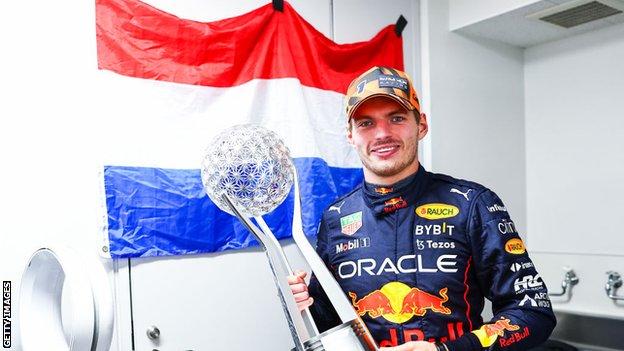
It was, Max Verstappen acknowledged, a “weird, confusing and quite funny” way of winning a world championship.
The Red Bull driver had won the Japanese Grand Prix – but he and pretty much everyone else in Formula 1 thought he had not quite done enough to seal a second world title just yet. Only for it to be decided a few minutes later that he had.
“I had no clue what they were going to decide with the points,” Verstappen said.
“When I crossed the line, I was not world champion yet.” Then someone said he was. “Are you sure?” he replied. Then he was told he wasn’t. And then finally, yes, he really was.
How had one of the world’s most high-profile sports found itself in a situation where someone has to decide in the moment how many points are awarded in a race, and the conclusion reached was different from what all the teams were expecting?
According to Verstappen’s team principal at Red Bull, Christian Horner, the answer was “a mistake” made in the redrafting of the regulations following another controversy over another race hit by bad weather, last year’s Belgian Grand Prix.
Back in Spa in 2021, the controversy was over the fact that a result was declared, and points awarded, despite no racing laps taking place because of torrential rain.
The intention was to re-write the rules to ensure that points could not be awarded unless there had been a genuine race, even if it was short.
Historically, it has always been the case in F1 that a shortened race would mean reduced points. Typically, 75% race distance was the mark at which full points were awarded.
But one four-word clause has changed all that.
In the rules governing a race suspension, a table is laid out detailing a set of points awarded in a series of scenarios. And in this table, between 50-75% race distance means three-quarter points.
But the clause in question starts by saying: “If a race is suspended, and cannot be resumed…” So the table, the FIA said on Sunday, only applies in the event a race is not restarted.
The problem that emerged in Japan is that nowhere in the rules does it lay out what happens to the points if the race is resumed – as happened at Suzuka, when a heavy crash on the first lap led to a two-hour stoppage and then a shorter race that ran to just over half the original distance.
With nothing in the rules specifying what to do, the FIA decided to award full points – against what the teams understood was the intention, and contrary to all historical precedent.
And that was the difference between Verstappen becoming champion already, or having to go to US Grand Prix on 21-23 October still needing to gain a point over team-mate Sergio Perez and Ferrari’s Charles Leclerc, whose error at the final chicane and subsequent five-second penalty and three points lost was enough to secure the title for Verstappen once the points situation had been clarified.
Ferrari team principal Mattia Binotto said: “We were confused ourselves; we did not think full points would be awarded.”
Red Bull motorsport adviser Helmut Marko said: “It was a surprise because our statisticians said we needed one more point.”
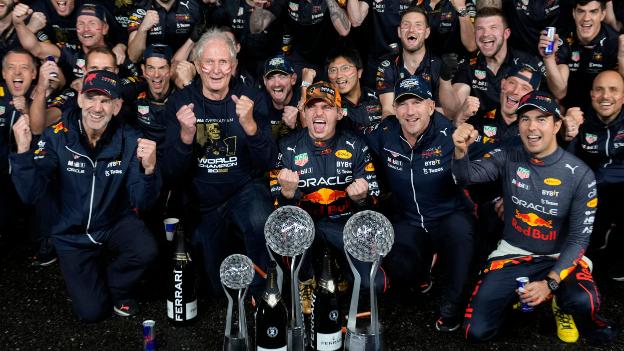
Mercedes agreed that the intent of the rules was to scale the points relative to race distance completed.
And the fact this was true can be determined by one simple fact – under the rules as written, officials could run just two racing laps, and award full points.
Horner said: “What was supposed to be fixed following Spa is unspecified in the regs, so unexpectedly we won.
“It was a mistake that wasn’t included after the issues of Spa. We were under the strong impression that only 75% of the points would be scored.”
And will be rule be revised? “I’m certain it will be,” Horner said.
An FIA spokesperson said: “This is something we’ll look into as part of our ongoing review processes and make any necessary updates as normal through the appropriate governance channels.”
This is now two championships in a row that have ended in controversy.
Last year, the problem was that the race director Michael Masi applied the rules incorrectly during a late safety-car period in the final grand prix of the season. This led directly to the championship changing hands, when Verstappen passed Lewis Hamilton on track when the grand prix was restarted for a single lap of racing.
This year, the errors with the rules had no effect on the destiny of the championship, only on the timing of when it was won.
But there is one huge irony here.
Rules are discussed with the teams and have to go through a formal approval process. But guess who wrote the new rule that has now been exposed so publicly?
Masi, before he was relieved of his post over the winter.
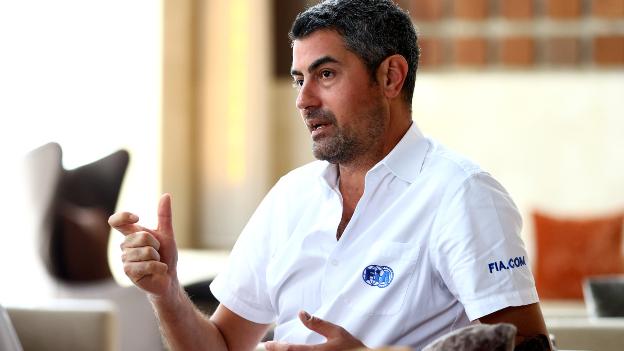
‘He is driving at another level to everyone’
From the FIA’s point of view, it was exactly what it did not need at the climax of a season that has been marked by growing dissatisfaction on behalf of the teams and F1 at the way the sport is being run.
From Verstappen’s, his crowning moment in a season in which he has been magnificently peerless was at least partially overshadowed.
“I don’t mind that it was a little bit confusing,” he said. “I actually find it quite funny.”
He can afford to be magnanimous, after the sort of year he has had.
In 2022, F1 embarked on a new era, with new technical rules aimed at closing up the field and making the racing better. One of those aims has been achieved – cars can race closer together. The other has very much not – Verstappen and Red Bull are putting together one of the most dominant seasons in F1 history.
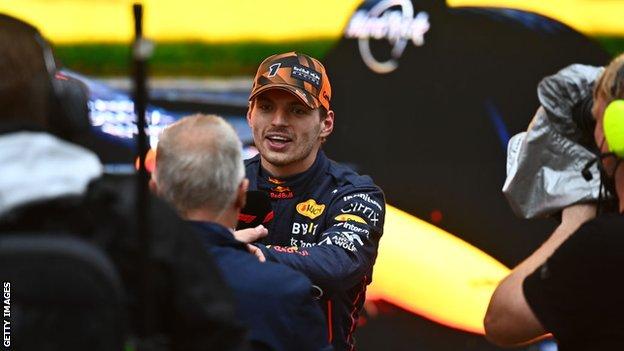
Japan was Verstappen’s 12th win in 18 races, and his fifth in the last six. With four grands prix still to go, it seems inevitable that he will smash the record for most wins in a season, currently held at 13 by his predecessor at Red Bull Sebastian Vettel and Michael Schumacher during his Ferrari pomp.
The year did not start that way. For the first half of the season, there was little to choose between Red Bull and Ferrari, Verstappen and Leclerc.
Leclerc opened up a 46-point advantage over Verstappen after just three races because the Dutchman retired from two of them when running second to him.
At the time, Verstappen felt that gap would be difficult to close. But then Ferrari’s season imploded in a torrent of engine failures and strategy errors – and a couple from Leclerc himself.
Until mid-July, the two cars were still close in performance, but as Red Bull took weight out of their car, it came alive for Verstappen. And while Perez still finds himself fighting the Ferraris, Verstappen now looks unbeatable, and able to win from pretty much anywhere on the grid.
“I don’t feel like Red Bull had a dominant car to win the championship the way Max won it,” Perez said on Sunday. “When he got comfortable with the car, he was driving at another level to everyone. Some of the races he did were incredible to watch.”
Indeed they were – the highlights among many being his winning from 10th on the grid in Hungary, 15th in Belgium and seventh in Italy.
Even before that, though, Verstappen already looked to have moved on this year from the already very high standards he was attaining previously. For Horner, the turning point was winning his titanic scrap with Hamilton last year.
“Last year was such a heavyweight bout between two titans,” Horner said. “And having achieved that last year, it released the pressure off his shoulders and he has gone out and smashed it out of the park.”
The blistering pace has remained, but Verstappen has married it to a level of maturity and control this year that has made him even more formidable.
On Sunday, Verstappen was only beginning the process of coming to terms with what he has achieved.
“Very different emotions [to last year],” he said, “but that’s because of the whole season being very different, completely different cars, a completely different way of racing, the amount of races we have won.
“Last year was all qualifying-dependent and now, even with some engine penalties, [it has been possible] to come back to the front.
“It has really been an enjoyable year and a very special year that will be very hard to match.”
